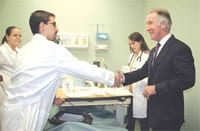AIC Wins $2.38 Million Grant to Help Disadvantaged Nursing Students
SPRINGFIELD — In what is being called the largest grant in American International College history, the college has received more than $2 million from the U.S. Department of Health and Human Services, Health Resources and Services Administration, for scholarships to disadvantaged nursing students in the bachelor of science in Nursing program.
Details of the grant were announced at a recent press conference attended by U.S. Rep. Richard Neal, state Rep. Benjamin Swan, and William Ward, executive director of the Regional Employment Board of Hampden County.
The grant, totaling $2.38 million over four years, was the largest grant awarded to a Massachusetts college under the Scholarships for Disadvantaged Students program (SDS); only 99 grants were awarded nationally.
This year the SDS program was redesigned to ensure meaningful awards to schools and therefore enable institutions to tackle the major barrier to a disadvantaged student’s access to a health-profession education, which is high tuition costs. It is expected that scholarship funds will enable more students to complete their education sooner without interruption and help to reduce student debt.
AIC President Vince Maniaci said awarding meaningful scholarships to at least 40 disadvantaged nursing students annually will enable more disadvantaged and minority students to obtain a baccalaureate degree in nursing. “This money will help high-achieving, financially needy students to seamlessly progress in their nurse education without interruption. It should also increase the number of diverse nurses able to serve their communities.”
The SDS program promotes diversity among health-profession students and practitioners by providing scholarships to full-time students with financial need from disadvantaged backgrounds, who are enrolled in health professions and nursing programs. Participating schools are responsible for selecting scholarship recipients, making reasonable determinations of need, and providing scholarships that do not exceed the allowable costs (i.e., tuition, reasonable educational expenses, and reasonable living expenses, with a cap for the total scholarship award of $15,000).
The new process includes a highly competitive application procedure. In addition, to be eligible for funding, schools must be carrying out a program to recruit and retain students from disadvantaged backgrounds, including students who are members of racial and ethnic minority groups.
AIC Provost Todd Fritch said the intent of the grant application was to obtain scholarship funding to support at least 40 disadvantaged BSN students. “AIC has a high percentage of first-generation and low-income students for whom the cost of attending the program poses a severe financial hardship. A Title III Institution, AIC has successfully developed and implemented programming to recruit and retain disadvantaged students.”
AIC currently has the largest BSN program in the area, and also offers a master of science in Nursing program.
Cesarina Thompson, dean of the AIC School of Health Sciences, said the award will help AIC continue to attract and retain new nursing students and increase the number of disadvantaged high-school students who enroll in AIC’s nursing program.
“The addition of new activities, coupled with the extensive and comprehensive academic support system already in place, will ease the transition to a four-year degree program and promote academic success,” she said. “It will also help us to increase the number of nurses in our region and respond to the national call for more highly educated and diverse nursing professionals who reflect the communities they serve.”
Removing at least some of that financial pressure is the goal, said Karen Rousseau, director of the Nursing program, adding that she’s had students drop out because they couldn’t keep paying tuition.
“We had one student who was homeless. He was living in his car and trying desperately to keep it secret so he could just stay in school and graduate,” she said. “Then he could get a job and rebuild his life.”
And the jobs are out there, Rousseau added. “Even though hospitals have had to lay off nurses recently, the population of working nurses is older and nearing retirement, and as those Baby Boomer nurses retire, employers will need to hire new workers.”
Ward said there are estimates that the need for new nurses will be acute just four years from now.
Neal said the federal Affordable Care Act will create 32 million new customers for healthcare because 32 million more people will have health coverage.




Comments are closed.